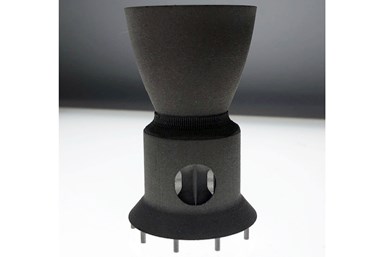6K Launches Refractory Metal Powders for Additive Manufacturing
Production scale of high-value materials such as tungsten and rhenium enables advanced application capabilities in aerospace, defense and medical industries.

Quadrus throat insert
6K Additive is launching refractory metal powders for additive manufacturing, including tungsten, rhenium, tungsten/rhenium and niobium-based powders which can be used for defense, aerospace and medical industries. These materials are said to be well suited for high-temperature, high-strength applications.
According to the company, defense organizations are not only looking for refractory materials such as tungsten and rhenium but they are looking for it at production scale. The company credits the uniqueness of its UniMelt microwave plasma process which has enabled it to manufacture production-scale volumes for many of the refractory powders. The company says it has spheroidized the full spectrum of refractory powders, including tantalum, niobium and molybdenum, to help organizations advance their applications with these materials.
In 2020, 6K Additive completed the construction of a state-of-the-art, 45,000-square-foot powder production facility in Burgettstown, Pennsylvania, which currently has two UniMelt microwave plasma systems commissioned with two additional systems scheduled for installation in late 2021. The company is constructing an expanded powder manufacturing building in late 2021 to add space for six additional systems. Installation of the additional systems will begin in early 2022.
The UniMelt system is the world’s only microwave production-scale plasma system, with a highly uniform and precise plasma zone with zero contamination and high throughput production capabilities, the company says. 6K Additive currently produces as commercially available powders Ti6Al4V (Grade 5 and Grade 23), SS316L and nickel superalloys Ni718 and Ni625, along with the announced refractory materials.
Related Content
-
New Zeda Additive Manufacturing Factory in Ohio Will Serve Medical, Military and Aerospace Production
Site providing laser powder bed fusion as well as machining and other postprocessing will open in late 2023, and will employ over 100. Chief technology officer Greg Morris sees economic and personnel advantages of serving different markets from a single AM facility.
-
Big Metal Additive: The Difference Between a Shape and a Part Is Quality
Preparing to scale directed energy deposition to ongoing full production is not a technological challenge: DED is ready. But it is an organizational challenge, says the company founder. Here is what it means to implement a quality system.
-
At General Atomics, Do Unmanned Aerial Systems Reveal the Future of Aircraft Manufacturing?
The maker of the Predator and SkyGuardian remote aircraft can implement additive manufacturing more rapidly and widely than the makers of other types of planes. The role of 3D printing in current and future UAS components hints at how far AM can go to save cost and time in aircraft production and design.











